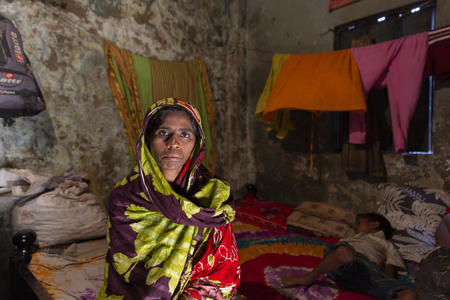“We had to flee extreme weather conditions such as floods and cyclones following severe river erosion in our hometown, Jamalpur”, says Mst. Sharifa. 7 years ago, Sharifa and her family moved to Pora Basti (slum) situated at Ward no. 14, Jatrabari, Dhaka.
Recalling the migration, she describes, “I used to stay in my husband’s home in Jamalpur since our marriage. We were poor but content as we had a shed over our head. But the devastating river erosion washed away all our land, leaving us homeless. We could not go and live with my parents, as they were too poor as well. My husband became ill from the worries and tyranny of reality. As we had nowhere else to go and nothing to hold onto, we were forced to leave our hometown and migrate to Dhaka.”
Once they managed to find a place to stay at the slum, their harrowing journey began. As there was no steady income, they could hardly afford her husband’s costly treatment for Cancer. Within few months, he passed away in acute suffering and pain leaving their three children in the care of Sharifa.
Sharifa had to keep supporting her family. To make ends meet, she started working as a day labourer at various brickfields. Currently, she earns a daily wage of Tk 350. Though, such an amount is also too insufficient to take care of her children. Given the increasing living expenses in Dhaka, it is often financially challenging for her to ensure the family’s educational, nutritional, and medical necessities.
Additionally, the living conditions in the slum area are too terrible. “Even a month before, there was no adequate sanitation facility or access to clean water. We had to use dirty water for bathing and cleaning. Falling sick was a common scenario here”, says Sharifa.
Such suffering and unhealthy displacements are not unprecedented in Bangladesh. Based on its geographical position and repeated change in climate patterns – climate impacts like River Erosion, Flash Floods, Cyclones, Heavy Rainfalls etc., are like the deadliest incidents destroying homes after homes, villages after villages every year, costing people their shelters, livestock, lands, health, livelihood, and wellbeing.
And even when people migrate to other cities for better opportunities and future, they undergo a constant battle against poverty and lack of access to basic needs such as water, sanitation, hygiene, education and health.
Join our climate fight
The climate crisis is a water crisis. Join us in our fight against climate change through building a global voice to influence policies, funding, and action in favor of the people most at risk.
Visit climate change, water and me to learn more
